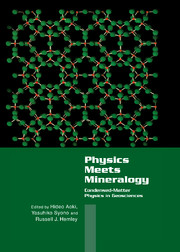Book contents
- Frontmatter
- Contents
- Preface
- List of Contributors
- Part I Introduction
- Part II Advances in Theoretical and Experimental Techniques
- Part III New Findings in Oxides and Silicates
- Part IV Transformations in Silica
- Part V Novel Structures and Materials
- Part VI Melts and Crystal–Melt Interactions
- Chapter 6.1 Comparison of Pair-Potential Models for the Simulation of Liquid SiO2: Thermodynamic, Angular-Distribution, and Diffusional Properties
- Chapter 6.2 Transport Properties of Silicate Melts at High Pressure
- Chapter 6.3 Structural Characterization of Oxide Melts with Advanced X-Ray-Diffraction Methods
- Chapter 6.4 Computer-Simulation Approach for the Prediction of Trace-Element Partitioning Between Crystal and Melt
- Subject Index
- Materials Formula Index
- Index of Contributors
Chapter 6.2 - Transport Properties of Silicate Melts at High Pressure
Published online by Cambridge University Press: 05 November 2011
- Frontmatter
- Contents
- Preface
- List of Contributors
- Part I Introduction
- Part II Advances in Theoretical and Experimental Techniques
- Part III New Findings in Oxides and Silicates
- Part IV Transformations in Silica
- Part V Novel Structures and Materials
- Part VI Melts and Crystal–Melt Interactions
- Chapter 6.1 Comparison of Pair-Potential Models for the Simulation of Liquid SiO2: Thermodynamic, Angular-Distribution, and Diffusional Properties
- Chapter 6.2 Transport Properties of Silicate Melts at High Pressure
- Chapter 6.3 Structural Characterization of Oxide Melts with Advanced X-Ray-Diffraction Methods
- Chapter 6.4 Computer-Simulation Approach for the Prediction of Trace-Element Partitioning Between Crystal and Melt
- Subject Index
- Materials Formula Index
- Index of Contributors
Summary
Diffusivity measurements in silicate liquids at high pressures have now been obtained up to 15 GPa and 2800 K by use of a multianvil apparatus. Most striking from these investigations is that oxygen and silicon self-diffusivities in Na2Si4O9 liquid increase continuously as a function of pressure from 2.5 to 15 GPa. According to the Eyring relation, this would suggest that the viscosity of the liquid decreases over the same pressure range. However, as the composition of the liquid becomes more polymerized, approaching metaluminous albite, diffusivities reach a maximum at pressures below 10 GPa and decrease with further increases in pressure. These results demonstrate the importance of considering compositional parameters, such as degree of polymerization and Al/Al + Si ratio, as well as pressure, when we are modeling magmatic processes in the Earth's deep interior.
Introduction
Magmatic processes within the Earth are controlled to a large extent by transport properties of silicate liquids. For example, both rates of magma ascent and rates of crystal settling during fractionation processes are controlled by the viscosity of silicate melts. In addition, ionic diffusion in silicate liquids controls rates of magma mixing, homogenization, and chemical equilibration and is therefore an important controlling parameter at all stages of magma evolution, from initial partial melting at depth to eruption or emplacement at or near the Earth's surface. Because a knowledge of the transport properties of silicate melts is essential for quantifying magmatic processes in the Earth, the viscosities of such melts have been studied extensively as functions of temperature and chemical composition at 1 bar with a range of experimental techniques [1].
- Type
- Chapter
- Information
- Physics Meets MineralogyCondensed Matter Physics in the Geosciences, pp. 340 - 353Publisher: Cambridge University PressPrint publication year: 2000
- 2
- Cited by



